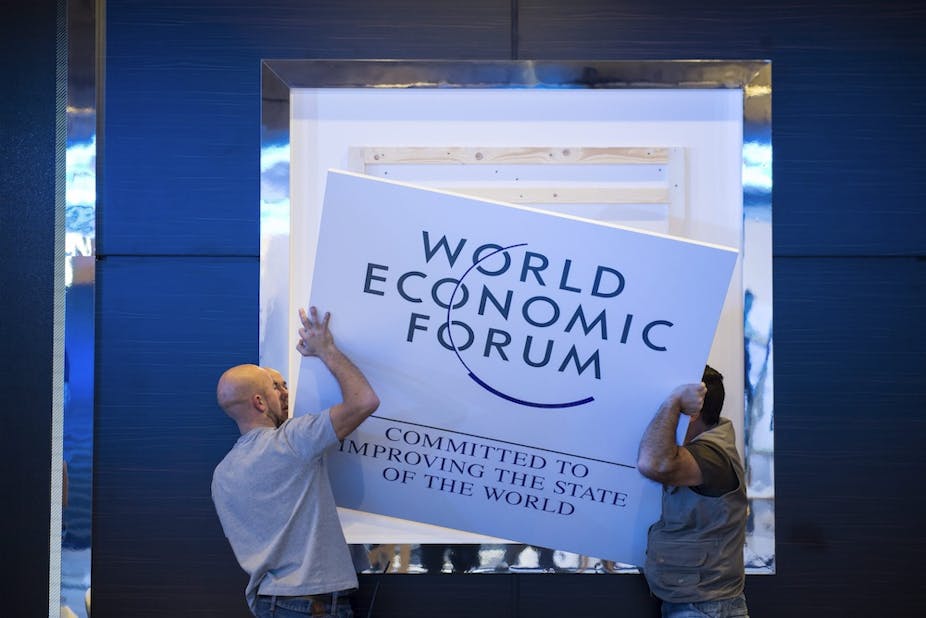When prime minister Tony Abbott delivers his speech outlining “Australia’s Vision for the G20” at the World Economic Forum (WEF) in Davos, Switzerland on Thursday, he will have the attention of some of the world’s economic and political elite.
Heads of state from 33 countries are attending, with speakers including Japanese prime minister Shinzo Abe, UK prime minister David Cameron, Mexican president Enrique Peña Nieto, Korean president Park Geun-Hye, and Brazilian president Dilma Rousseff, as well as Nobel laureates, business giants like Bill Gates, actor Matt Damon and, of course, pop star Bono.
One notable exception is the United States, although US Secretary of the Treasury Jacob Lew and Senator John McCain will be speaking. Gita Wirjawan, Indonesia’s trade minister, is also listed, so Abbott can expect an uncomfortable conversation about maritime borders with him.
Also in the room will be Ban Ki-moon, Secretary-General of the United Nations, and many other heads of international organisations.
And they will all be listening closely to what Australia will deliver as host of the G20 in Brisbane in November. In Davos, Abbott is host of the G20 first, and Australian prime minister second.
Spruiking the G20 agenda
So what is on the line for Abbott at Davos? His express purpose should be to socialise the agenda for the Brisbane G20 Leaders Summit, give more detail on outcomes he is expecting and find out where the heat will be in negotiations. He needs all the G20 country leaders to commit to coming and be in a mood to negotiate.

Then he needs to build the credibility of the G20 as a forum that can deliver certain policy outcomes good for everyone, such as better financial regulation to avoid another fiscal crisis in a key economy that “spills over” to affect citizens in other nations. This was identified as the number one systemic risk by the annual WEF Global Risks survey in 2014.
If Australia can encourage G20 countries to invest in macroeconomic co-ordination, and if other countries accept the utility of this role, the forum will be more meaningful and thereby strengthen the G20 as an actor. This is clearly in Australia’s national interest as a member of the G20, as Australia might not be a member of any rival grouping.
Our G20 presidency has suffered from awkward timing due to last year’s G20 summit in St Petersburg falling just before the federal election where Abbott took power. His administration has had a lot to catch up on, a litany of diplomatic issues, and little time to reflect since taking over as host of the G20 (with Russia and Turkey in the troika) on December 1.
However, this is the moment where Abbott needs G20 world leaders to invest in the summit, and he needs to explain to the rest of us what Australia will strive to achieve in more detail.
The Big Reveal
So why has Abbott chosen Davos for the big reveal? If the G20 is viewed as “a big hot tub party” for world leaders, what does that make Davos? In one sense, it underlines his “Australia is open for business” public diplomacy narrative, and it lets him get to 33 world leaders at once, global media editors and more than 1000 business leaders.

Abbott is joined on the agenda by B20 Australia chairman Richard Goyder. Also at Davos are B20 Sherpa Robert Milliner and B20 Australia Leadership Group members Westpac chief Gail Kelly, Telstra boss David Thodey and Hamish Tyrwhitt, chief executive of Leighton Holdings, who will be hosting a dinner for Abbott.
The B20 are Australian business leaders chosen by the Gillard government to bring business leaders from the G20 countries together to pose policy recommendations to the G20 leaders. It traditionally has a closer, cosier relationship with G20 leaders than the other social partners such as the C20, the L20, the Youth 20, and the Think20.
In some ways, the World Economic Forum is more progressive than the current G20 agenda. International Monetary Fund (IMF) managing director Christine Lagarde is expected to come out swinging on inequality, including gender equality, during her Davos speech.

The new Oxfam report Working for the Few, to be delivered by Oxfam CEO Winnie Byanyima at Davos, contains the remarkable statistic that the bottom half of the world’s population owns the same as the richest 85 people in the world, and must surely be making some of those 85 squirm. The World Bank has understood the economic consequences of climate change in a forthright manner that G20 leaders have not.
But even so, if one of the big G20 agenda issues is tightening bank regulation, increasing corporate transparency, stopping corruption and cracking down on corporate tax evasion across state borders, surely some of the Davos attendees are a target as well as a partner.
Political leaders will need to display courage at the Brisbane Summit to put their citizens interests above or at least alongside those of global markets. Abbott will need to show serious courage in his leadership in November to reconcile these varied interests and bring a benefit to Australian citizens.

